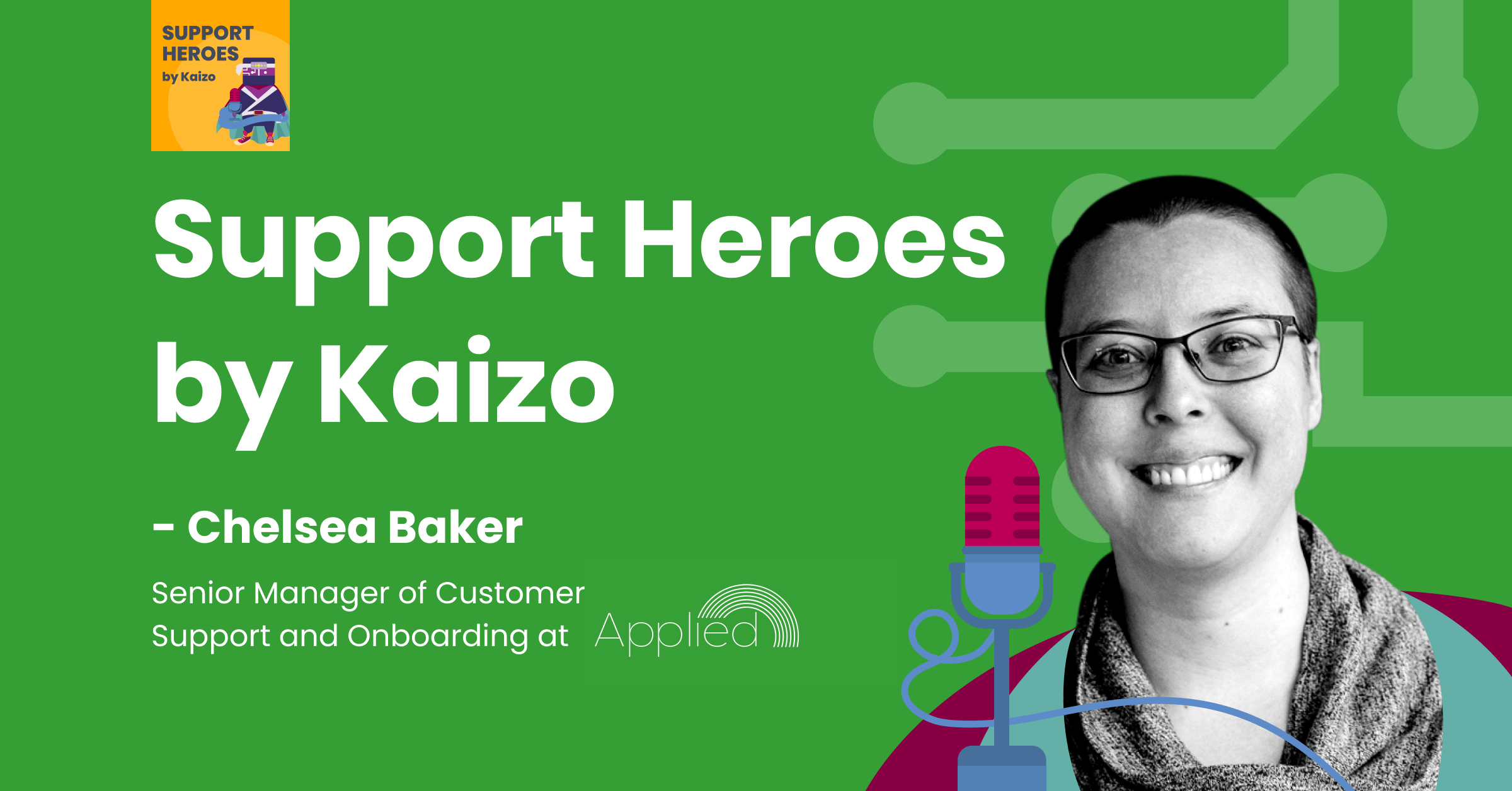Click ‘subscribe’ in the bottom right of the player to listen or download from Apple Podcast, Spotify, Google Podcast, and Amazon Music.
The sixteenth release of Support Heroes by Kaizo featured Chelsea Baker- Senior Manager of Customer Support and Onboarding at Applied Training Systems, Inc.
In this episode, Chelsea Baker recounts the lessons she learned about support leadership over years of experience at Applied Training Systems, Inc and Recruiterbox. She opens up about the evolution of her confidence as a manager and elaborates on how her management style was formed by her experiences both before and after the pandemic. Tune in to hear Chelsea’s advise for aspiring support leaders everywhere.
Key Highlights
1. Confidence as a manager doesn’t just come from expertise
2. Take a step back- support the team that supports the customers
3. Showing vulnerability, asking questions and taking suggestions
Confidence as a manager doesn’t just come from expertise
“I started managing that team because I was the person who knew the most about the product. I became that manager by expertise.”
This expertise gave Chelsea confidence as a support leader…
“I felt like knowing all the things about the product made me a good manager”
“I was the person who knew everything and I was able to give advice for that reason”.
However, when her company acquired 3 more products, suddenly the basis of Chelsea’s confidence was taken away.
“I went from managing this team I had hired and curated that worked on a product that I knew literally everything about…”
“…to managing these teams I knew nothing about and I knew nothing about their products.”
“There was a lot of impostor syndrome”
In addition, the day-to-day of managing her team also had to change as she no longer had the technical knowledge necessary to supplement her team operationally.
“ Previously, I could step into every single job that my team did and do it for them if someone was out or we had attrition on the team. That was not how I could manage this new team”
Nevertheless, Chelsea conquered these challenges and emerged as a seasoned and more confident support leader than she would have been without these experiences.
“I think people in support feel that a lot- when they come up the ranks and they know a product really well, it can be scary to then go be a manager of a product you don’t know.”
The lesson here is don’t be intimidated. Confidence can come from many different things.
Take a step back- support the team that supports the customers
“One of the hardest things [about becoming a manager] was pulling back from the daily ticket duties.”
“I had to really force myself to let my team do that work, let them make mistakes and let them write replies that might not be exactly what I would write…
“…otherwise I was not giving them the ownership of the tasks and they were completely dependent on me.”
Chelsea believes this is not optimal. The goal of a manager is to let the team work and not to make the team’s work dependent on the manager.
“I started to think of my employees as the people I got to help and the problems I was solving was [to benefit] them. Instead of [just] solving problems for the customers”
Growing in support often involves thinking about the customer and making their lives better but being a support leader, also involves supporting those that support the customers- the agents.
“Now one of the big [sources of] satisfaction that I get as a manager is getting to solve the problems of my employees and making their day better”
“Solving those problems is a lot less about my ego when I think about it as solving [the team’s] problems”
Which means that one’s confidence is not at threat and the job is that much easier to do.
Showing vulnerability, asking questions and taking suggestions
“[Not always having the answers] called me to ask a lot more questions of my team and be a lot more open with them…”
“…asking them, ‘how would you solve this problem’ or ‘if you were in my shoes, what would you do’ because I didn’t have all of the answers”
This also means that more than one mind is tackling the problem.
“My management style is very much, ‘don’t bring me problems, bring me suggestions and then we’ll work together towards a solution”
“Letting them fill in the sticky details and just guide those conversations, grew them as people because it made them more independent”
Which was a natural progression away from the initial focus of Chelsea’s confidence as a manager.
“There’s a huge amount of vulnerability in being a leader and I think it’s a piece of leadership that’s left out way too often”
“If 2020 taught us anything, it was vulnerability had to be a part of our workspace”
Being vulnerable takes more confidence than not being able to be vulnerable. Which is a true indictment of Chelsea’s progression. Though, this also resulted out of necessity.
“I took over the leadership of two of our products that I had led before, 3 weeks before we took all of our employees remote because Covid went rampant”
“I had to open up. Be that vulnerable person and be able to say, ‘I am not sure what the best thing is but with everything I know I’ve made the best decision I can make and then we’re going to figure this out together.’”


